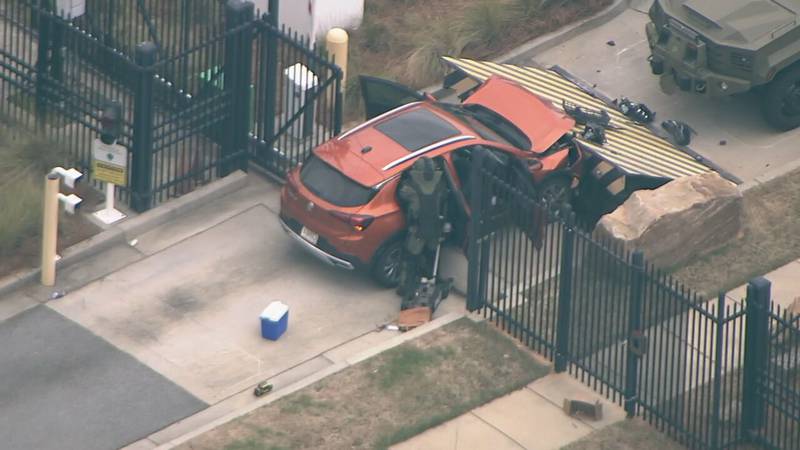Former senator Joe Lieberman knows better than most the impact third-party bids can have on presidential
elections. His 2000 Democratic campaign for vice president fell just 537 Florida votes short of victory, in a state where Ralph Nader, the liberal activist and Green Party nominee, won more than 97,000 votes.
But that didn’t stop the Connecticut Democrat turned independent from joining a meeting Thursday in support of plans by the centrist group No Labels to get presidential ballot lines in all 50 states for 2024. The group calls its effort an “insurance policy” against the major parties nominating two “unacceptable” candidates next year.
Asked if President Biden, his former Senate colleague, would be unacceptable, Lieberman said the answer was uncertain.
“No decision has been made on any of that. But we’re putting ourselves in a position,” Lieberman said. “You know, it might be that we will take our common-sense, moderate, independent platform to him and the Republican candidate and see which one of them is willing to commit to it. And that could lead to, in my opinion, a No Labels endorsement.”
Uncertainty over the $70 million No Labels ballot effort has set off major alarm bells in Democratic circles and raised concerns among Republican strategists, who have launched their own research projects to figure out the potential impacts. As Lieberman spoke, the Arizona Democratic Party filed a lawsuit
to block No Labels from ballot access in that state on procedural grounds. Matt Bennett of the centrist Democratic think tank Third Way has argued that the plot is “going to reelect Trump,” and Adam Green of the Progressive Change Campaign Committee has accused No Labels of wanting “to play the role of spoiler.”
“The only way you can justify this is if you really believe that it doesn’t really matter if it is Joe Biden or Donald Trump,” said Stuart Stevens, a former presidential campaign strategist for George W. Bush, John McCain and Mitt Romney, who now works with the anti-Trump Lincoln Project. “So it is sort of a test. If you live in a world where it doesn’t matter, this is kind of harmless. If you live in a world where it does matter, it is dangerous.”
Splits have also emerged inside the organization. William Galston, a Brookings Institution policy scholar, said this week that he would separate himself from No Labels, which he helped found, over its 2024 planning for a third-party campaign to challenge Biden and Trump.
“I am proud of No Labels’ record of bipartisan legislation, and I know its leaders want what is best for the country. But I cannot support the organization’s preparation for a possible independent presidential candidacy,” he said in a statement. “There is no equivalence between President Biden and a former president who threatens the survival of our constitutional order. And most important, in today’s closely divided politics, any division of the anti-Trump vote would open the door to his reelection.”
No Labels chief executive Nancy Jacobson said Galston had added a lot to the No Labels cause. “We’re sad to see him go,” she said in a statement.
Among the group’s advisers is former North Carolina governor Pat McCrory, a Republican who just lost a Senate bid in the face of Trump opposition; former director of national intelligence Dennis Blair; and Benjamin Chavis Jr., a former executive director of the NAACP.
“I just wanted to emphasize on the spoiler question: I would not be involved if I thought in any account that we would do something to spoil the election in favor of Donald Trump,” Chavis said at the meeting, which was attended in person or via Zoom by 16 No Labels staff and supporters, including Blair and McCrory. “That’s just not going to happen.
”
Sen. Joe Manchin III (D-W.Va.), who has not declared whether he will run for reelection next year, and former Maryland governor Larry Hogan (R) are also supporters of the effort, and both said they have not ruled out participating in a No Labels presidential ticket, if it happens.
“If enough Americans believe there is an option and the option is a threat to the extreme left and extreme right, it will be the greatest contribution to democracy, I believe,” Manchin said in an interview. When asked whether he would participate in a No Labels ticket, he said, “I don’t rule myself in and I don’t rule myself out.”
“I think it is really important to have that option. Because we have never been at the point we are today in America,” Hogan added. “The vast majority of people in America are not happy with the direction of the country and they don’t want to see either Joe Biden or Donald Trump as president.”
The group has already gained ballot access in Arizona, Colorado, Alaska and Oregon, with signature-gathering efforts underway in many other states. Jacobson, a former Democratic fundraiser, said the organization has until March 2024 to make a decision on whether to field a presidential ticket. It would pick one Republican and one Democrat as presidential and vice-presidential nominees, she said, with an announcement of their identities coming no later than April 15 of that year, when a No Labels convention is planned in Dallas.
Jacobson has not revealed the identities of the donors funding the effort, saying she is shielding them from public attacks, and will not discuss possible names of potential candidates. The group, which helped to found the House Problem Solvers Caucus, was founded in 2010 as a policy antidote to rising polarization. It later established political fundraising efforts to support candidates that backed its agenda.
Rep. Josh Gottheimer (D-N.J.), a co-chair of the Problem Solvers Caucus, distanced himself from No Labels 2024 planning. “This is not an effort I’m personally involved with or supportive of,” he said in a statement.
Rep. Brian Fitzpatrick (R-Pa.), the other co-chair, said he supports more voices in U.S. politics. “If our 247-year-old American experiment is to survive, there must be a centrist voice at the table in this conversation,” he said.
Jacobson has left open the possibility that No Labels could use its ballot lines to field third-party candidates for Senate or House races, a potential nightmare scenario for some Democrats given the recent decision of Sen. Kyrsten Sinema (I-Ariz.) to leave the party.
“It could happen, but no plans at this time,” she said. “It is one ticket, one time. We are not a political party.”
The group plans to roll out a “common sense policy agenda” this summer to rally the country around bipartisan solutions to the nation’s problems, such as pairing more border security with a path to citizenship for undocumented immigrants who came to the United States as children.
“Americans like choices,” said Ryan Clancy, a No Labels senior adviser. “We are heading down a road where both parties could be looking at the public and saying, ‘Yeah, two-thirds of you don’t want this choice but too bad. It’s your only choice and you’ll like it.’ We think we can do better.”
At the center of its strategy is a controversial reading of opinion polls, including extensive surveys that No Labels has commissioned from HarrisX, a company whose corporate parent is overseen by Jacobson’s husband, Mark Penn, a former adviser to Hillary Clinton who has distanced himself from the Democratic Party. Clancy said Penn is not involved with No Labels.
In a slide deck presented at the meeting Thursday, the leaders of No Labels argued that high levels of economic concern, growing independent voter identification and the conviction among many people that the country is on the wrong track all set the stage for a third-party bid to be more successful than at any time in recent history.




